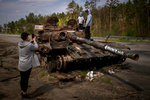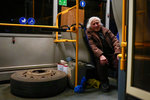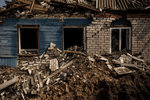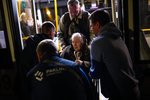



ZAPORIZHZHIA, Ukraine (AP) — Russian President Vladimir Putin used a major patriotic holiday Monday to again justify his war in Ukraine but did not declare even a limited victory or signal where the conflict was headed, as his forces continued to pummel targets across the country with few signs of significant progress.
The Russian leader oversaw a Victory Day parade on Red Square, with troops marching in formation, military hardware on display, and a brass band blaring to mark the Soviet Union's defeat of Nazi Germany. But his much-anticipated speech offered no new insights to how he intended to salvage the grinding war — and instead stuck to allegations that Ukraine posed a threat to Russia, even though Moscow’s nuclear-armed forces are far superior in numbers and firepower.
“The danger was rising by the day,” he said as he surveyed the troops. “Russia has given a pre-emptive response to aggression. It was a forced, timely and the only correct decision.”
Ukrainian leaders and their Western backers have often rejected claims that Kyiv posed any threat to its giant neighbor.
There was “nothing significant in Putin’s speech today, but he will need to make a decision regarding mobilization in the coming weeks,” wrote Rob Lee, a senior fellow at the Philadelphia-based Foreign Policy Research Institute, on Twitter.
As Putin laid a wreath in Moscow, air raid sirens echoed again in Kyiv, the Ukrainian capital. But Ukrainian President Volodymyr Zelenskyy declared in his own Victory Day address that his country would eventually defeat the Russians.
“Very soon there will be two Victory Days in Ukraine,” he said in a video released to mark the holiday. “We have never fought against anyone. We always fight for ourselves. ... We are fighting for freedom for our children, and therefore we will win.”
An adviser to Zelenskyy also pushed back against the idea that Ukraine and its Western allies posed any threat to Russia.
Mykhailo Podolyak wrote on Twitter that “NATO countries were not going to attack Russia. Ukraine did not plan to attack Crimea,” which Russia seized in 2014.
The Ukrainian military’s General Staff warned Monday of a high probability of missile strikes on the holiday, and Britain’s Defense Ministry said in its daily assessment Russian forces could increasingly subject Ukrainian towns and cities to “intense and indiscriminate bombardments with little or no regard for civilian casualties" as they run short of precision-guided munitions.
In fact, more than 60 people were feared dead after a Russian bomb flattened a Ukrainian school being used as a shelter in Bilohorivka, an eastern village, Ukrainian officials said.
With the war now in its 11th week, battles were being waged on multiple fronts, but Russia was perhaps closest to victory in Mariupol, where Ukrainian fighters are making a last stand at a sprawling steel mill in a battle that has highlighted some of the worst suffering of the war.
The complete capture of Mariupol would deprive Ukraine of a vital port, allow Russia to complete a land corridor to the Crimean Peninsula, and free troops up for fighting elsewhere in the Donbas, which is now Putin's stated focus following his failure to seize the capital in the early days of the conflict. The fall of the city would provide a much-needed symbolic victory for Russia.
Russian forces pounded away over the weekend at the plant, where as many as 2,000 Ukrainian fighters are are estimated to be holding out.
“We are under constant shelling,” said Capt. Sviatoslav Palamar, deputy commander of the Ukrainian Azov Regiment, which held the mill.
Lt. Illya Samoilenko, another regiment member, said a couple hundred wounded soldiers were inside. He declined to say how many able-bodied fighters remained. He said fighters had to dig by hand to free people from bunkers that collapsed under shelling.
For weeks, hundreds of civilians also took shelter with the fighters at the plant, but the last were evacuated Saturday. In a convoy led by the United Nations and international Red Cross, they arrived Sunday night in Zaporizhzhia, the first major Ukrainian city beyond the frontlines. They spoke of constant shelling, dwindling food, ubiquitous mold — and using hand sanitizer for cooking fuel.
The Ukrainian military warned Russian troops were seizing "personal documents from the local population without good reason” in parts of the Zaporizhzhia region that they controlled — allegedly as a way to force residents to join in Victory Day commemorations.
As a stiffer than expected Ukrainian resistance, bolstered by Western arms, has bogged down Russian forces, Moscow scaled back its war aims. It is now pressing offensives in some areas of southern Ukraine and the Donbas, where Moscow-backed separatists have fought Ukrainian troops for years. But they still have struggled to make significant strides, and Ukrainian and Russian forces have fought village by village in recent weeks.
A Ukrainian counteroffensive in the northeast near Kharkiv, outside of the Donbas but key to offensive there, was making “significant progress,” according to the Institute for the Study of War, a Washington-based think tank.
However, Rodion Miroshnik, a pro-Kremlin official in the Luhansk region of the Donbas, said Moscow-backed separatist forces and Russian troops had captured most of Popasna, an embattled city that saw two months of fierce fighting.
The southern Black Sea port of Odesa has also seen increased fighting recently, and Ukrainian officials said Russia fired four cruise missiles targeting the city Monday from Crimea. It said no civilians were wounded in the attack, but did not elaborate on what was struck.
“The enemy continues to destroy the infrastructure of the region and exert psychological pressure on the civilian population,” the command said. “There is a very high probability of continued missile attacks in the region.”
As they struggle to make gain, Russian forces have repeatedly shelled cities and towns indiscriminately. About 90 people were sheltering in the school basement in Bilohorivka when it was attacked Saturday. Emergency crews found two bodies and rescued 30 people, but “most likely all 60 people who remain under the rubble are now dead,” Serhiy Haidai, governor of Luhansk province, wrote on the Telegram messaging app.
Ukraine’s military also warned some 19 Russian battalion tactical groups were stationed just across the border in Russia’s Belgorod region. Those groups likely consist of some 15,200 troops with tanks, missile batteries and other weaponry.
As Victory Day turned attention toward Putin, Western leaders showed new signs of support for Ukraine.
The Group of Seven leading industrial democracies pledged Sunday to ban or phase out imports of Russian oil.
The United States, meanwhile, announced new sanctions, cutting off Western advertising from Russia’s three biggest TV stations, banning U.S. accounting and consulting firms from providing services, and cutting off Russia’s industrial sector from wood products, industrial engines, boilers and bulldozers.
U.S. first lady Jill Biden met Sunday with her Ukrainian counterpart. Canadian Prime Minister Justin Trudeau raised his country’s flag at its embassy in Kyiv. And U2′s Bono, alongside bandmate The Edge, performed in a Kyiv subway station that had been used as a bomb shelter, singing the 1960s song “Stand by Me.”
__
Gambrell reported from Lviv, Ukraine. Yesica Fisch in Bakhmut, David Keyton in Kyiv, Yuras Karmanau in Lviv, Mstyslav Chernov in Kharkiv and AP staff around the world contributed to this report.